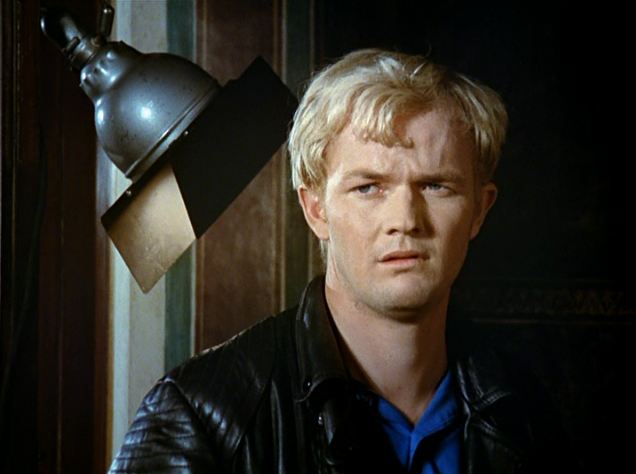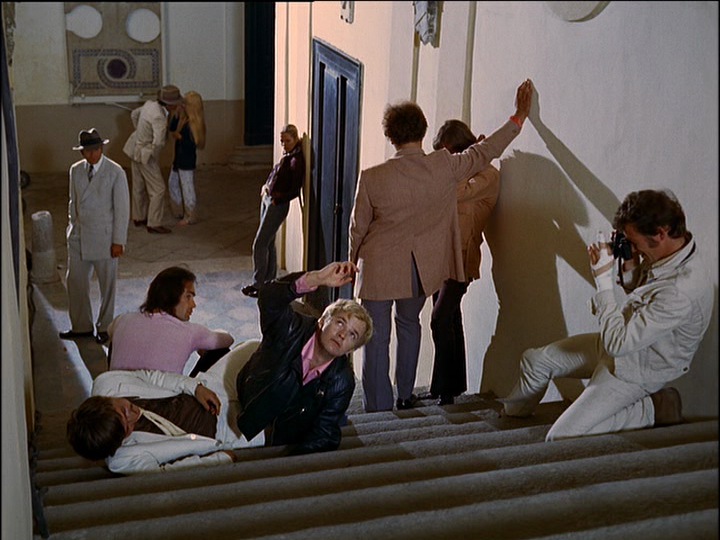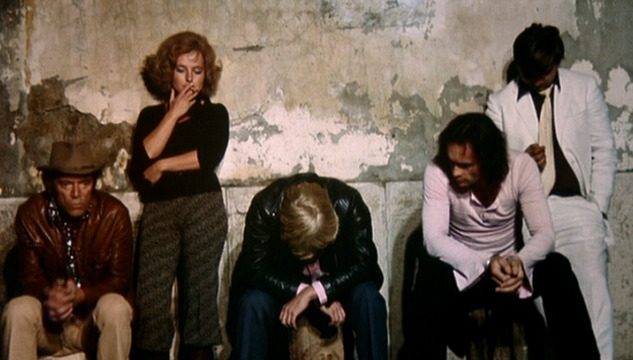Archiving my fairly massive vinyl collection, I have discovered that many of my most cherished records have little market value, while many that I rarely play have the most. Yet this may not be a bad thing when it comes to art in general–leaving out, however, any mention of what it does to the artists.
In a just world, Beware of a Holy Whore (1970), written, directed and edited by Rainer Werner Fassbinder, who also acts in the film, would have a hefty price tag. Instead it is the cherry on the top of the cinematic sundae that is the eminently affordable Criterion DVD collection of Early Fassbinder.
Don’t get me wrong: I’m not stuck in the past. But there are always films that, I trust the writers for and the readers of The Solute would agree, must be re-watched to help us maintain our bearings. In this series, I hope to explain what some of these films, for me, are.
Like many of the films I most cherish, there is the reversal of expectations in Beware of a Holy Whore. Holed up in a Spanish resort, a film crew seeks an escape from escape. The pleasant surroundings only serve to heighten the tension caused by frustration and boredom, with which the crew members attempt to deal by copious drinking.
The emphasis of the cinematography (credit to DP Michael Ballhaus) on vividly bright colors adds to the sense of unreality, as do the Leonard Cohen songs we hear playing in the background—we start to feel as unmoored as the crew getting wasted at the bar. Few filmmakers can make us feel this way: the freewheeling party atmosphere has been compared to the signature scenes of Robert Altman, but his characters always choose, or not (which is still a choice), to express their opinions. In this film, no one is much interested in letting us know who they are or what they care about.

The humor, as deadpan as you’ll find this side of Jim Jarmusch (yet fourteen years prior), comes from watching these besotted men and women just trying to maintain. The arrival of the director and star actor only makes things worse. Obnoxious and bullying even by the accepted community standards, the director isn’t even sure he wants to take up the challenge of supervising a film that is intended to convey a protest against violence by the state, and he carries a sense of persecution to absurd lengths. The star, in subtle but cutting ways, enforces a social hierarchy on the set.
The director’s acting out—at one point, he screams, “You want my blood! I hate you all!”—reminds us that the film’s being a time capsule of period fashions does not obscure the ugly things that happen in unequal power relationships. Fassbinder himself, who plays a harried assistant, later cuckolded, illustrates that old adage: shit rolls downhill.
Fassbinder positions us between seeing the film as a tragedy of failed collective activism and a comedy of pretentions—what does manage to get shot comes off as mediocre melodrama that has overtones of artistic self-sabotage. Post-election, this double imaging strikes as dark of a chord as Cohen’s running his fingers over the nylon strings of his guitar. Can we embrace such an abject sense of failure? If we can, will it drive us out of our minds?
 Make no mistake, however, the social commentary is far from being direct, unlike The Damned (1969), with its profane meditations on fascism, another film that ought to be required viewing in these now even more troubled times. What Fassbinder is getting at, which anticipates his next artistic phase, epitomized by Ali: Fear Eats the Soul (1974), is that art cannot provide workable solutions to social problems. Again, in Beware of a Holy Whore, this is doubly represented, the film being made looks to be a flop; the film that Fassbinder has made is, overly, and mockingly so, bitter and cynical.
Make no mistake, however, the social commentary is far from being direct, unlike The Damned (1969), with its profane meditations on fascism, another film that ought to be required viewing in these now even more troubled times. What Fassbinder is getting at, which anticipates his next artistic phase, epitomized by Ali: Fear Eats the Soul (1974), is that art cannot provide workable solutions to social problems. Again, in Beware of a Holy Whore, this is doubly represented, the film being made looks to be a flop; the film that Fassbinder has made is, overly, and mockingly so, bitter and cynical.
But if we’re just about ready to dismiss the film as a too obvious put-on, Fassbinder has an amazing trick up his sleeve. With no setup, the camera focuses on a half-naked group of people lying on a dock (the image reproduced on the cover of the Criterion DVD), haphazardly arranged but barely moving.
What’s fascinating is that Zabriskie Point, released in the same year, 1970, featured an orgy scene, but was intended as a choreographed portrait of liberation and subversion. There is nothing particularly remarkable about this similar scene in Beware of a Holy Whore, which makes it all the more remarkable. It stands as Fassbinder’s memorable statement about how sexual politics is not free from apathy, gaining increased resonance post-election.
Beware of a Holy Whore doesn’t end as much as it stops. To use a musical cue, the film takes after the innovation of James Brown and electric-era Miles Davis who created music that eschewed forward motion for endless flow. The groove Fassbinder finds is indeed downbeat, and, of course, the title overshadows everything, suggesting the dangers of people believing that they are, or believed to be, spiritually superior to everyone else. This, like all other beliefs in progress, is ripped apart.
The film is ultimately about regret. Trapped in the moment, the director and star actor will not realize they’ve blown a valuable opportunity until after their film is made—that is, if it ever gets made—and it’s too late to do anything about it, but move on. It’s hard not to think that most artists, whatever their worth, feel this way, indeed have to, as a means of survival in a world where everyone has his or her price.

